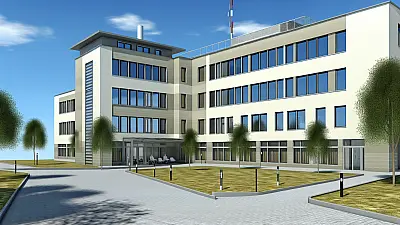HOMER, LA - A recent state inspection at Presbyterian Village of Homer revealed a kitchen equipment safety violation that could pose fire and health risks to residents and staff.

Deep Fryer Equipment Failure Creates Safety Concerns
During a May 29, 2025 inspection, state surveyors documented that Presbyterian Village of Homer failed to maintain essential kitchen equipment in safe operating condition. The primary violation centered on the facility's deep fryer, which had accumulated dangerous levels of grease buildup in its internal compartment.
The inspection began on May 27, 2025, when surveyors conducting their initial kitchen observation at 8:50 a.m. immediately identified the problematic condition of the deep fryer. The equipment's internal compartment showed heavy grease accumulation that posed multiple safety risks to the facility's food service operations.
Later that same day at 2:27 p.m., the facility's Dietary Manager confirmed the surveyors' findings, acknowledging that the deep fryer's internal compartment had significant grease buildup and required immediate cleaning.
Fire Safety and Food Contamination Risks
Heavy grease buildup in commercial kitchen equipment creates multiple serious hazards in healthcare facilities. Accumulated grease represents a significant fire risk, as it can ignite at high temperatures and spread rapidly throughout kitchen areas. Commercial deep fryers operate at temperatures between 325-375 degrees Fahrenheit, making grease fires particularly dangerous when equipment maintenance is neglected.
Beyond fire safety concerns, excessive grease accumulation compromises food safety standards. Old, degraded grease can harbor harmful bacteria and produce toxic compounds that contaminate food prepared for residents. This is especially concerning in nursing home environments where residents often have compromised immune systems and may be more susceptible to foodborne illnesses.
The buildup also indicates inadequate cleaning protocols, which can lead to equipment malfunction and reduced operational efficiency. When deep fryers aren't properly maintained, they may not reach or maintain proper cooking temperatures, potentially resulting in undercooked food that poses additional health risks.
Industry Standards for Kitchen Equipment Maintenance
Federal regulations require nursing homes to maintain all mechanical, electrical, and patient care equipment in safe operating condition. For commercial kitchen equipment, this includes regular cleaning schedules, preventive maintenance programs, and immediate attention to any safety hazards.
Industry best practices call for daily cleaning of deep fryer equipment, including thorough cleaning of internal compartments to prevent grease accumulation. Weekly deep cleaning protocols typically involve complete equipment breakdown and sanitization. Many facilities implement detailed maintenance logs and inspection checklists to ensure compliance with safety standards.
The Centers for Medicare & Medicaid Services requires nursing homes to have comprehensive maintenance programs that address both routine upkeep and emergency repairs. Kitchen equipment maintenance is particularly critical because it directly impacts resident nutrition and safety.
Regulatory Response and Compliance Requirements
The violation was classified as causing minimal harm or potential for actual harm, affecting few residents. However, kitchen safety violations can quickly escalate if not addressed promptly, as fire hazards and food safety issues impact the entire facility population.
The facility must now develop and implement corrective measures to address the deep fryer maintenance issue and prevent recurrence. This typically includes updating cleaning protocols, staff training programs, and equipment inspection schedules.
State surveyors will likely conduct follow-up inspections to verify that Presbyterian Village of Homer has resolved the equipment safety violation and implemented adequate preventive measures. The facility must demonstrate that proper maintenance protocols are in place and being consistently followed.
Importance of Proactive Equipment Maintenance
This violation highlights the critical importance of proactive equipment maintenance in healthcare facilities. Regular cleaning and maintenance schedules prevent minor issues from becoming major safety hazards that could endanger residents and staff.
Proper kitchen equipment maintenance also supports the facility's ability to provide nutritious meals that meet residents' dietary needs and medical requirements. When equipment fails or operates unsafely, it can disrupt meal services and compromise the quality of care provided to residents.
The incident serves as a reminder that nursing home operators must maintain rigorous oversight of all facility systems, including kitchen operations that may seem routine but are essential to resident safety and wellbeing.
Full Inspection Report
The details above represent a summary of key findings. View the complete inspection report for Presbyterian Village of Homer from 2025-05-29 including all violations, facility responses, and corrective action plans.
💬 Join the Discussion
Comments are moderated. Please keep discussions respectful and relevant to nursing home care quality.